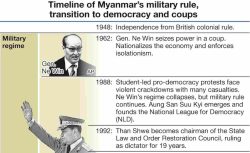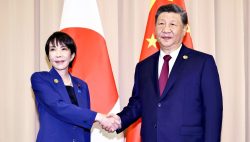15:22 JST, November 6, 2024
Will the policy discussions between the ruling parties of the Liberal Democratic Party and Komeito, and the Democratic Party for the People not descend into lavish handouts from the budget? Is the DPFP prepared to also take responsibility for measures to secure financial resources?
The ruling parties and the DPFP have agreed to begin discussions on matters including new economic measures and tax reform. The biggest focus is the elimination of the “¥1.03 million barrier,” which imposes income tax on annual income exceeding ¥1.03 million.
This is considered to be one of the “annual income barriers,” factors that restrict the number of working hours for part-time and other workers.
The DPFP pledged to increase take-home pay for workers during its campaign for the House of Representatives election, and insists that the threshold of ¥1.03 million should be raised to ¥1.78 million.
As the grounds for this assertion, the DPFP cites the fact that the minimum wage has increased 73% from 1995, when the figure was set at ¥1.03 million.
If the minimum taxable income is unchanged from about 30 years ago while prices have been rising, it will cause extensive harm. Given the current labor shortages, raising the threshold itself is worth considering.
However, there are many points to consider regarding the specific amount of the increase.
Tax revenues for the central and local governments are estimated to decrease by about ¥7 trillion to ¥8 trillion if the figure is raised. If the revenue loss is covered by issuing government bonds, the burden will be passed on to future generations as a result.
Some people have been concerned that the higher the annual income, the larger the tax cut. This is because, for instance, if the minimum taxable amount is raised to ¥1.78 million, the tax cut is estimated to be ¥86,000 for an annual income of ¥2 million, compared to ¥228,000 for an annual income of ¥8 million.
Regarding financial resources, the DPFP claims that the tax cut will boost consumer confidence and increase tax revenues as well. However, this is overly optimistic. If revenues do increase, there are many other areas to which they should be allocated. Fiscal consolidation is one of them.
In addition, annual income barriers are not limited to the ¥1.03 million barrier. The barriers of “¥1.06 million” and “¥1.3 million,” which are subject to social insurance premiums depending on the size of the company and other factors, have a more significant impact on the amount of take-home pay. It is important to look at the system as a whole and take time to discuss the issue.
Another point of contention is whether to invoke a so-called trigger clause, which would cut about ¥25 from the gasoline tax of about ¥54 per liter and suppress prices. This would result in a total revenue decrease of ¥1.5 trillion for the central and local governments, as well as an increase in gasoline consumption, which would run counter to decarbonization.
Basically, economic measures and the taxation system should be promoted in consideration of the overall balance of policies, including measures for financial resources.
It would be nothing short of irresponsible if the DPFP is simply trying to take advantage of the weakness of the minority ruling parties only to achieve its own demands.
In addition, if Prime Minister Shigeru Ishiba makes repeated concessions to preserve his Cabinet within the framework that he calls a “partial coalition,” it will result in the top party being swayed by the No. 4 party, which only destabilizes the political situation.
(From The Yomiuri Shimbun, Nov. 6, 2024)
Top Articles in Editorial & Columns
-

Myanmar Will Continue Under Military Rule Even After Election, Ex-Ambassador Maruyama Says in Exclusive Interview
-

40 Million Foreign Visitors to Japan: Urgent Measures Should Be Implemented to Tackle Overtourism
-

Expansion of New NISA: Devise Ways to Build up Household Assets
-

China Criticizes Sanae Takaichi, but China Itself Is to Blame for Worsening Relations with Japan
-

Withdrawal from International Organizations: U.S. Makes High-handed Move that Undermines Multilateral Cooperation
JN ACCESS RANKING
-

Univ. in Japan, Tokyo-Based Startup to Develop Satellite for Disaster Prevention Measures, Bears
-

JAL, ANA Cancel Flights During 3-day Holiday Weekend due to Blizzard
-

China Confirmed to Be Operating Drilling Vessel Near Japan-China Median Line
-

China Eyes Rare Earth Foothold in Malaysia to Maintain Dominance, Counter Japan, U.S.
-

Japan Institute to Use Domestic Commercial Optical Lattice Clock to Set Japan Standard Time



















